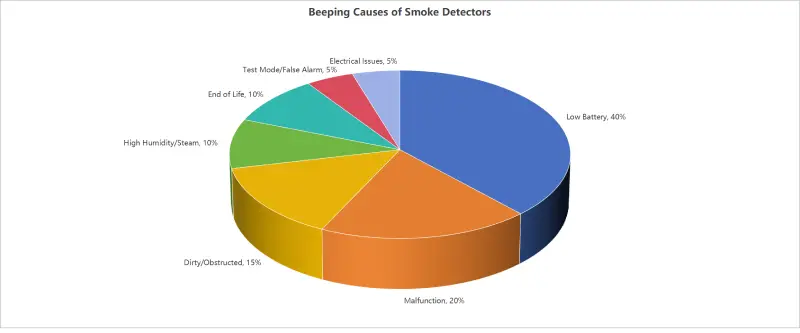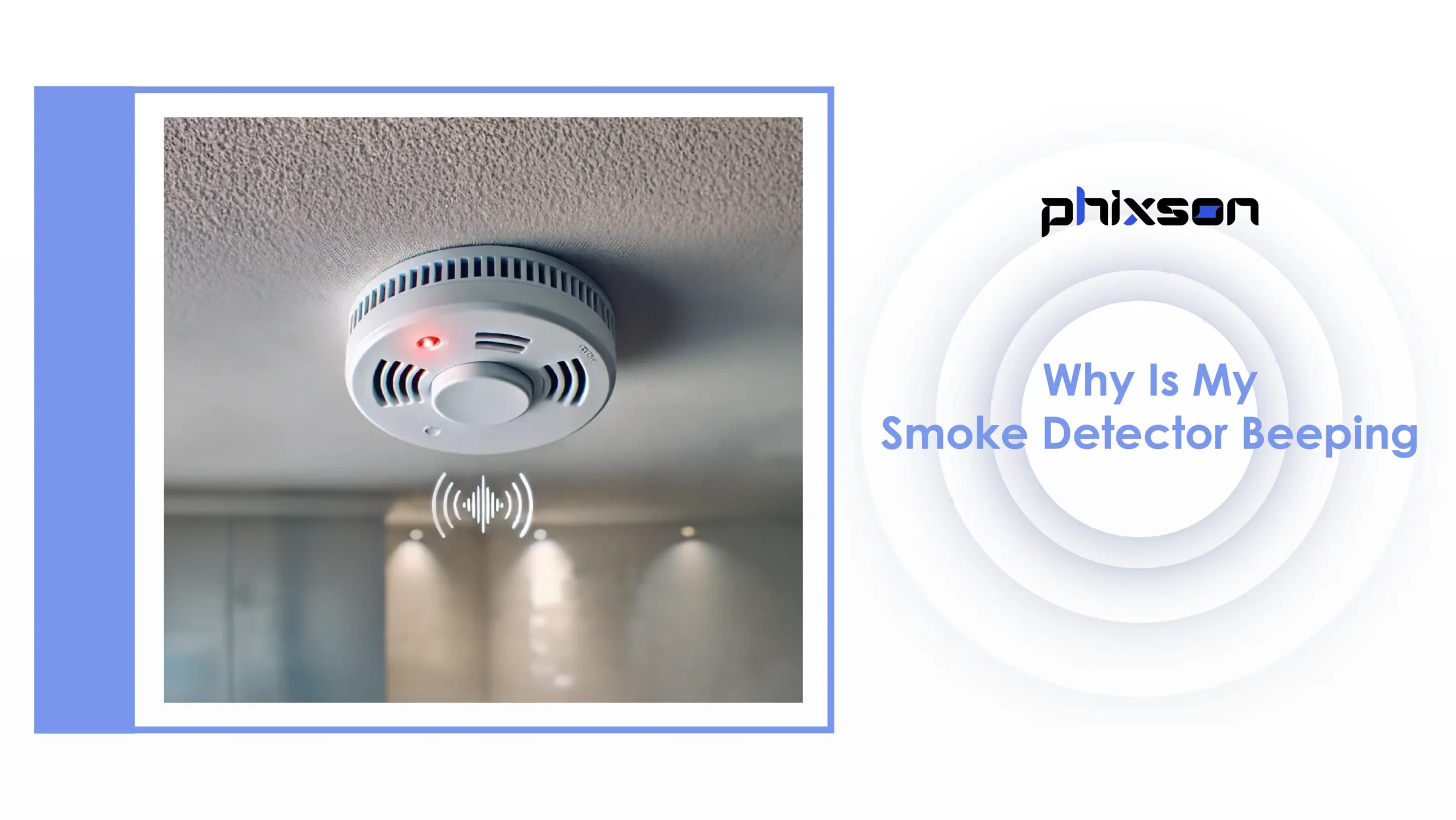Warum piept mein Rauchmelder?? Wir Phixson Führen Sie eine Forschung an, die auf unseren Daten zum täglichen After -After -Service basiert. Auch, Nach unserer zehnjährigen Erfahrung, Wir werden den Grund für die Punkte erklären, einschließlich verschiedener gemeinsamer Situationen. Schließlich werden wir die entsprechenden Lösungen nacheinander teilen.

Das obige Kreisdiagramm zeigt, dass eine niedrige Batterie aufnimmt 40 Prozentsatz aller Gründe. Fehlfunktionsabdeckungen 20 Prozent, Ranking der zweiten Hauptgründe für das Pieping. Schmutzig & Obstruktion, Hohe Temperatur & Dampf und Lebensdauer können manchmal die Faktoren sein. Sie halten jeweils 15%, 10% Und 10%.
Warum piedigt mein Rauchmelder mit einem grünen Licht?
Normalerweise, Der Piepton des Rauchmelders hängt eng mit seinen Arbeitszustand und Umweltfaktoren zusammen. Wenn der Rauchmelder fehlt oder fehlerhaft ist, Es gibt einen konstanten Piepton aus. Der Fehler kann auf ein Schaltungsproblem im Alarm zurückzuführen sein. Beispiele sind beschädigte Sensoren, niedrige Batterieleistung, oder alternde Leiterplatten. Zusätzlich, Umweltfaktoren können auch zu Fehlalarmen führen. Zum Beispiel, Eine Umgebung mit hoher Luftfeuchtigkeit kann die Sensorempfindlichkeit erhöhen, was zu falsch positiven Ergebnissen führt. Zusätzlich, Staub oder Insekten, die in die Innenseite des Alarms eintreten, kann auch den normalen Betrieb beeinträchtigen, was zu einem Piepton führt.
Jedoch, Nicht alle Pieps bedeuten, dass der Alarm fehlerhaft ist. In einigen Modellen von Rauchmelden, Das grüne Licht zeigt normalerweise an, dass es in normalem Arbeitszustand ist. Zu diesem Zeitpunkt, Wenn der Alarm einen kurzen Summer emittiert, Es kann durch vorübergehende Probleme wie vorübergehende Änderungen der Luftqualität verursacht werden. Zum Beispiel, Flüchtige Substanzen wie Ölrauch oder Parfüm, die während des Kochens erzeugt werden, können den Alarmsensor vorübergehend beeinflussen, dazu führen, dass es piept. Zusätzlich, Vorübergehende Fehler können auch den Alarm bewirken, Aber solche Fehler erholen sich normalerweise in kurzer Zeit alleine.
Warum tut es Mein Alarm geht aus, wenn Sie die Batterien wechseln?
Moderne Rauchmelder enthalten hochempfindliche elektronische Komponenten, die auf jegliche Störung der Stromversorgung als mögliche Systemanomalie äußerst wachsam sind. Wenn der Akku ersetzt oder entfernt wird, Das Gerät erfährt einen kurzen Stromverlust. Dies reich. Diese Empfindlichkeit des Designs ist wichtig, um sicherzustellen.
Um mit Stromausfällen fertig zu werden, Moderne Rauchmelder sind auch mit Kondensatoren im Inneren geliefert, Dies kann eine bestimmte Menge an Restenergie speichern. Auch nach dem Entfernen der Batterie, Die in diesen Kondensatoren gespeicherte Energie kann den Alarmmechanismus aktivieren, den Detektor dazu veranlasst, einen kurzen Alarmschall zu emittieren. Dieses Phänomen, obwohl kurzlebig, bietet ein wichtiges Signal für Techniker, um sich selbst zu diagnostizieren.
Zusätzlich, Moderne Rauchmeldersysteme sind häufig so konzipiert, dass sie miteinander verbunden sind, mit einzelnen Detektoren, die miteinander kommunizieren. Wenn die Batterie in einem der Detektoren ersetzt wird, Diese Verbindungseigenschaft kann eine synchrone Antwort von den anderen Detektoren auslösen. Es gibt also einen ähnlichen kurzen Alarmgeräusch. Dieses Design ist kein Unfall, Aber eine absichtliche Ergänzung des Herstellers, um die Integrität und Zuverlässigkeit des gesamten Sicherheitssystems zu überprüfen.
Warum steckt mein Rauchdetektor auch nach dem Wechsel der Batterie immer wieder ein??
Der elektrische Gedächtnismechanismus ist einer der Schlüsselfaktoren im kontinuierlichen Piepton moderner Rauchmelder. Diese Alarme mit einem Fortgeschrittenen Mikroprozessor hätte eine Speicherfunktion. Es kann Fehlercodes oder Systemalarminformationen auch nach dem Austausch des Akkus beibehalten. Diese elektronischen Erinnerungen verschwinden nicht alleine, wenn wir sie vollständig zurücksetzen, um potenzielle Warnsignale zu entfernen.
Zusätzlich, Das Problem der Staubakkumulation im Detektorsensorhohlraum kann nicht ignoriert werden. Im Prozess der langfristigen Verwendung, Feine Staubpartikel sammeln sich allmählich auf der Oberfläche des Sensors an, die den normalen Betrieb des optischen Sensors beeinträchtigen. Diese Störung kann dazu führen, dass Geräte die Umgebungsbedingungen fälschlicherweise als potenzielle Sicherheitsbedrohungen interpretieren, falsch positive Ergebnisse auslösen. Neben der Staubakkumulation, Luftfeuchtigkeit, Temperaturschwankungen, und Änderungen in der umgebenden Luftqualität können auch den normalen Betrieb des Detektors beeinflussen, was zu unerwarteten Antworten führt.
Es ist erwähnenswert, dass Alter und Verschleiß auch wichtige Faktoren sind, die die Funktion von Rauchmelden beeinflussen. Da wird das Gerät länger verwendet, Die internen Komponenten verschlechtern sich allmählich, was zu einem Rückgang der Erfassungsfähigkeiten führt. Dieser Verschlechterung zeigt sich besonders bei Geräten, die älter als zehn Jahre sind. Um das zu bekämpfen, Hersteller entwerfen Rauchmelder mit einer geplanten Veralterungstrategie im Auge, Ziel, Benutzer zu ermutigen, ihre Geräte regelmäßig zu ersetzen, um sicherzustellen, dass die Sicherheit zu den besten Standards entspricht.
Warum piedigt mein Rauchmelder ohne Akku?
Speziell, Ein Sicherungssystem in diesen Rauchmelden wird aktiviert, wenn der Akku entfernt wird oder die Hauptstromversorgung fehlschlägt. Das System kann zuvor gespeicherte elektrische Energie oder Restladung in Kondensatoren verwenden, um die Kernkomponenten des Alarms weiterhin mit Strom zu versorgen. daher, Auch wenn der Akku entfernt wurde, Der Alarm kann aufgrund des Vorhandenseins von Restladungen immer noch einen kurzen Piepton ausgeben.
Es ist erwähnenswert, dass der durch diese Restgebühr ausgelöste Piept, Da das Backup -System nur begrenzte Leistung hat und hauptsächlich zum Auslösen von Alarmen im Notfall verwendet wird. Sobald die Restladung erschöpft ist, Der Piepton wird natürlich aufhören.
Warum tut es Mein Alarm geht mitten in der Nacht aus?
Temperatur FLuctuation
Dramatische Änderungen der Raumtemperatur in der Nacht können zu Fehlfunktionen von Rauchmelden führen. Wenn das Heizsystem zykliert oder die Außentemperatur sinkt, Eine plötzliche Änderung der Temperatur kann empfindliche Alarmsensoren auslösen. Ältere Rauchmelder sind besonders anfällig für diese Umweltveränderungen, insbesondere in Häusern mit schlechter Isolierung oder signifikanten Temperaturunterschieden zwischen Tag und Nacht.
Luftfeuchtigkeit und MOistur
Hohe Luftfeuchtigkeit kann Kondensation des Rauchmelders verursachen, Dies kann Fehlalarme verursachen. Feuchtigkeitsaufbau tritt häufig in Bereichen wie Badezimmern auf, Küchen, und in der Nähe von Fenstern oder Kriechräumen, die Alarmsensoren beeinträchtigen können. Die Luftfeuchtigkeit nimmt normalerweise nachts zu, So kann der Feuchtigkeitsanbau einen unerwarteten Alarm auslösen.
Staub und DEbris Bud UP
Im Laufe der Zeit, Staub, Kleine Insekten und andere winzige Partikel können sich im Rauchmelder aufbauen. Diese winzigen Eindringlinge stören die internen Sensoren des Geräts, zufällige Aktivierung verursachen. Nachts, Die Umgebung ist relativ ruhig, Und selbst die kleinste Sensorstörungen können spürbar werden, einen plötzlichen Alarm auslösen.
Batterie Aging
Alternde Batterien in Rauchmelden können zu zeitweise und unvorhersehbarem Verhalten führen. Wenn die Batteriestrom abnimmt, Sie können inkonsistente Signale an das Alarmsystem senden. Diese Leistungsverschlechterung ist nachts besonders ausgeprägt, wenn die Temperaturen kühler sind, Wenn die Batterieleistung von Natur aus abnimmt.
Elektrisch ICHNterferenz
Elektronik in der Nähe, fehlerhafte Verkabelung, oder elektromagnetische Störung kann manchmal zu Fehlfunktionen von Rauchmelden führen. Elektrogeräte ein- und ausschalten, Blitz, oder sogar Schwankungen im Netz können nachts eine unerwartete Alarmantwort auslösen.
Kohlenstoff MOnoxid POtential RISK
Obwohl weniger verbreitet, Nachtalarme können auch das tatsächliche Vorhandensein von Kohlenmonoxid anzeigen. Heizölausrüstung, die ineffizient arbeiten, wie Öfen, Warmwasserbereiter, oder Gasherde, kann Kohlenmonoxid produzieren. Wenn der Alarm ausdrücklich Kohlenmonoxid anzeigt, Evakuieren Sie sofort und bitten Sie einen Fachmann, zu überprüfen.
Warum piedigt mein Rauchmelder, wenn es kein Feuer gibt??
Die Gründe dafür sind fast die gleichen wie im vorherigen Absatz erwähnt.
- Temperaturschwankung,
- Luftfeuchtigkeit und Feuchtigkeit,
- Staub- und Trümmerakkumulation,
- Batteriealterung,
- Elektrische Störung,
- Das potenzielle Kohlenmonoxidrisiko kann die Gründe sein.
Warum ist mein Rauchmelder ohne Grund pieft??
Trotzdem, Wir sollten alle Faktoren in Betracht ziehen, einschließlich niedriger Batterie,Fehlfunktion,schmutzig/behindert, hohe Luftfeuchtigkeit/Dampf,Lebensende,test mode/false alarm, elektrische Probleme.
FAQ
Was jeder Rauchmeldeketektor bedeutet
Zwitschern alle 30 Zu 60 Sekunden
Rauchmärchen zwitschern alle 30 Zu 60 Sekunden, Dies zeigt normalerweise eine Warnung mit niedriger Batterieladung an. Auf diese Weise, Das Gerät zeigt an, dass sein Akku niedrig ist und sofort ersetzt werden muss. Das Design wird absichtlich ärgerlich genug, um die Menschen zum Handeln zu veranlassen.
Wenn der Rauchmelder weiterhin ein lautes Piepton emittiert, Dies bedeutet, dass tatsächlicher Rauch oder potenzielles Feuer festgestellt wurde. Dies bedeutet, dass Sensoren eine reale Bedrohung identifiziert haben, die eine sofortige Evakuierung und eine Notfallreaktion erfordert. Wenn das passiert, Nehmen Sie es unbedingt ernst und folgen Sie Ihrem Brandschutzplan für Brandschutz.
Summt viermal, Pausen und wiederholt
Wenn ein Rauchmelder viermal summt, Dann pausiert und wiederholt das Muster, Es zeigt normalerweise das Vorhandensein von Kohlenmonoxid an. Moderne Rauchmelder mit Kohlenmonoxiderkennung Verwenden Sie diesen einzigartigen Rhythmus, um sie von Standardfeueralarmen zu unterscheiden. Wenn Sie dieses Muster hören, Evakuieren Sie sofort und wenden Sie sich an Rettungsdienste.
Emittiert alle paar Minuten ein kurzes Zwitschern
Alle paar Minuten, Der Rauchmelder gibt ein kurzes Chirp aus, Dies zeigt an, dass der Rauchmelder selbst das Ende seines Lebensdauers erreicht hat. Danach 8 Zu 10 jahrelange Nutzung, Der Detektor wird weniger zuverlässig und muss vollständig ersetzt werden. Dieses intermittierende Chirp ist die Art und Weise, wie das Gerät seinen allmählichen Rückgang der Funktionen kommuniziert.
Wenn ein Rauchmelder drei laute Summen macht und dann macht Pause, Dies bedeutet normalerweise, dass Rauch in einem bestimmten Bereich erkannt wurde. Dieses Muster hilft zu bestimmen, welche miteinander verbundenen Detektoren zuerst ein potenzielles Brandgefahren erfassen, Helfen Sie, den Standort potenzieller Probleme zu bestimmen.
Emittiert eine schnelle und anhaltende Piepton
Wenn der Rauchmelder einen schnellen und anhaltenden Piepton ausgibt, Dies kann auf einen Fehler der internen Sensoren oder des elektrischen Systems des Geräts hinweisen. Dies kann durch Staubaufbau verursacht werden, Sensorschäden, oder elektrische Störungen, die professionelle Inspektion erfordert.
Unregelmäßige oder zufällige Piepe weisen häufig auf eine Vielzahl von potenziellen Problemen hin: Batterieausfall, Sensorkontamination, elektrische Störung, oder Umweltfaktoren wie Luftfeuchtigkeit und Temperaturschwankungen.
Wie man einen Rauchmelder vom Pieping verhindert
| Gründe | Portion | Lösung |
| Batterie schwach | 40% | Ersetzen Sie durch einen neuen 9 -V -Akku. Stellen Sie die korrekte Installation sicher. Testfunktionalität. |
| Fehlfunktion | 20% | Durch Trennen der Kraft zurücksetzen. Ersetzen Sie die Einheit, wenn Probleme fortgesetzt werden. Garantie überprüfen. |
| Schmutzig/behindert | 15% | Mit Druckluft reinigen. Flüssigkeiten vermeiden. Sanft staubsaugen. |
| Hohe Luftfeuchtigkeit/Dampf | 10% | Aus Dampfbereichen umziehen. Verwenden Sie feuchtigkeitsbeständige Modelle. |
| Lebensende | 10% | Jeden ersetzen 8-10 Jahre. |
| Test Mode/False Alarm | 5% | Drücken Sie monatlich die Testtaste. |
| Elektrische Probleme | 5% | Überprüfen Sie die Verkabelung. Bei Bedarf Elektriker konsultieren. |
